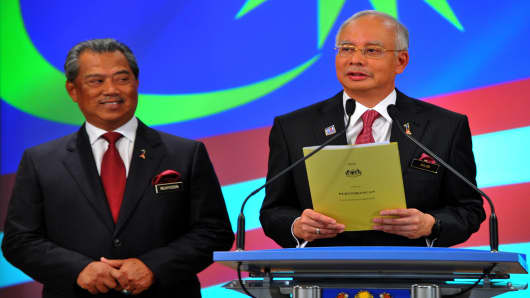Malaysia's economy grew at its slowest pace in three years in the first quarter prompting analysts to revise their growth forecasts for this year, less than two weeks after an election win for the country's ruling party sparked a wave of optimism about the country's outlook.
First quarter gross domestic product data (GDP) released late on Wednesday showed Southeast Asia's third biggest economy grew a weaker-than-expected 4.1 percent from a year earlier on poor exports, down from a strong 6.5 percent in the final three months of last year.
That news helped knock Malaysian stocks down almost 0.8 percent to around 1,769 on Thursday, about 3 percent below a record high hit on May 6 – a day after Malaysia's ruling coalition party returned to power after a closely-run general election, easing concerns about political uncertainty.
(Read More: Malaysia Stocks Hit Record High After Elections)
The GDP data also prompted some economists to downgrade their forecasts for growth.
"We think that the first quarter GDP data are a setback and as a result, we now look for 2013 GDP growth to come in at 5 percent year on year with downside risks [compared to our previous estimate of 5.4 percent]," analysts at OCBC Bank said in a note.
CIMB Economics Research, meanwhile, lowered its 2013 growth forecast for Malaysia to 5.1 percent from 5.5 percent following the weaker-than-expected data, local media reported.
Tim Condon, head of research for Asia at ING Financial Markets, said he was also mulling a revision to his GDP forecast of 5 percent for Malaysia this year, adding that the big miss for first quarter GDP data also made the central bank's forecast for 5-6 percent GDP growth this year look optimistic.
(Read More:Malaysia to Unleash Up to $2.6 Billion in IPOs)
Keeping the Ringgit Low
Given that demand for Malaysian exports may remain weak given the sluggish recovery in the global economy, analysts said Malaysia's central bank may be reluctant to let the local currency, the ringgit, strengthen too much.
The ringgit has gained about 5 percent against the U.S. dollar so far this year and hit its highest levels since September 2011 following the general election. It was trading at about 3.01 to the dollar on Thursday.
"At this juncture, we wouldn't be surprised if the central bank were to be a bit more uneasy to let the ringgit outperform its regional peers going forward," OCBC said.
(Read More: Malaysia Vote Puts This Currency Back in Play)
ING's Condon added: "We consider the post-election sell-off in the dollar/ringgit a buying opportunity."
- By CNBC.Com's Dhara Ranasinghe, Follow her on Twitter: @DharaCNBC



